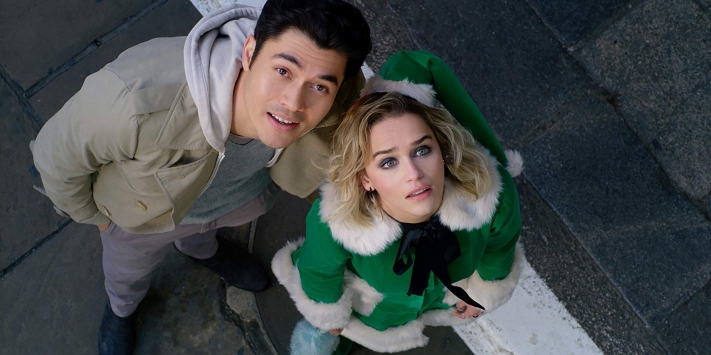Why this year you should not shy away from watching a Christmas rom-com.
It is not a very common occasion to come across a rom-com that is set during Christmas in London. This description, alongside Peter Bradshaw’s review of the film for The Guardian, scream “this is the trashy movie that I should definitely avoid before the end of the year.” Or, if you are like us: “this is the trashy movie I should definitely watch before the end of the year.” And we certainly did not regret the evening we spent immersing ourselves in the universe of this film, where humour and politics come together to show us how everyone’s lives are interconnected and how the power of hope that lies in human connections can surpass both individual and collective struggles (especially in a city like London). If you think this movie is going to be ‘trash’ you are in for a surprise!
The story follows Kate (Emilia Clarke) around London. Kate is homeless, working as an elf and struggling to realise her dream of becoming a West End star. Her family is originally from former Yugoslavia, and Kate has a very rocky relationship with her mother (Emma Thompson, who is the co-writer of the film). Their two worlds seem to constantly clash and Kate finds it hard to accept any help from her. Meanwhile Kate’s messy personal life is also interfering with her friendships and her job selling christmas decorations. A serial victim of her circumstances, she avoids facing her problems until she meets the mysterious, yet superbly kind and wise, Tom (Henry Golding). The romance that is sparked between the two characters takes us on a walk around London that is painting a picture of how inhumane the city can be but also how powerful human connection is in holding the strings of our lives together.
An interesting point about this film is how it played off genre expectations through its promotional material to create a very specific picture of the film. Trailers and posters leaned on the romantic aspect of the plot, the fact that the lead character was, at some point, ill as well as emphasizing the connection to George Michael’s music. However, these aspects are not necessarily the most prominent or time-consuming for the plot. Instead, Last Christmas is largely about Kate’s growth and independence through social connections. While her journey out of self-sabotage begins with a few nudges from Tom, it’s really when she starts having bilateral relationships with others that she moves towards a healthier lifestyle. Kate only starts taking care of herself, being mindful of her health condition, when she stops seeking others out only because she needs something from them. At the start of the film we see Kate as someone who only takes, who gives the bare minimum back to the people in her life who offer her help. These egoistic tendencies were hurting others but also negatively impacting all of Kate’s well-being.
The film does not provide a Christmas-miracle solution to Kate’s problem. There is no magical moment of revelation where Kate realizes she cannot keep her lifestyle up, as there are in other Christmas films. Last Christmas shows a gradual recognition of issues and a gradual way to take action in a holistic way to resolve existing problems. Kate doesn’t just have to change how she eats, she doesn’t just have to meet the “right guy” who changes her world, she doesn’t just have to be kinder to those that have given her opportunities, she has to do all this and more.
The didactic message of the film is that changing oneself is hard work and that it is not possible in an isolated manner. In other words, Kate is able to find tranquility, love, and a healthy way of accepting her immigration story, by integrating herself back into social life and by working on all aspects of herself. When she starts volunteering at a homeless shelter she starts taking responsibilities again, which means that she must be well-enough to be depended on. The people she meets there become her friends. When she begins to care about work again not only does she help her boss, Santa, but she also decides to pause the auditions that were making her miserable. When she begins to repair her relationship with her family, she also helps her mother feel more independent and she unearths a new empathy towards her Yugoslavian community and identity. In this film, actions are the most important thing and the most impactful, so said by Tom that “you’re made up of everything you do.” And it is through her new attitude and actions that Kate’s full potential begin to shine. What seemed like a paradox at first, that you need to rely on others to get more independence, makes sense: it is through sociality that annihilation of the ego begins and that we can start being present for those around us.
Last Christmas also does what many other apparently “lighthearted” films do: sneak in serious issues unexpectedly. Because it is set in 2017, the plot coincides with the beginnings of Brexit. As Yugoslavian immigrants, the discourse of xenophobia that followed this political move affects Kate’s family. Her mother, in particular, is almost inconsolable, believing they would be forced to leave another country because of political situations. While this is not a major aspect of the movie, I think it is notable that it is in a George Micheal song-title-based Christmas rom-com Brexit and rise of hate crimes are discussed and not in any other major releases I have seen. Comedy is often a great way to get people to think about difficult topics such as this. Once you grab people’s attention with what seemed like just entertainment, you drop the message you want. Films like “Step Up: Revolution” that appeared to be dancing chaos but actually discussed issues of displacement that seriously affect people living in Miami. A movie like “Fist Fight” that can be silly and questionable but also was heavily about how budget cuts make teacher’s lives unbearable. Why is it that releases like this tackle very real issues? Is this just as efficient a way to discuss topics as when the same themes are put in dramas? Do wide releases not have a bigger audience anyway?
This film does have a sympathetic outlook towards the very real and very scary peril immigrants face in a Brexit environment. However, neither writers or directors are immigrants themselves. Emma Thompson is not from former-Yugoslavia and yet she plays and writes this role. In a way the sentiment an immigrant story rang hollow knowing it did not come from a voice with this experience. Similarly “Knives Out” suffered from the same issue: as much as it sided with the horrors of the immigrant experience Rian Johnson is not an immigrant himself. As a Latin American immigrant who wants more representation I ask: if you want our voices, let us speak for ourselves. No amount of research will give you lived experience, which is essential to these stories.
We don’t want to spoil the brilliant plot development, but we can simply say that this movie sets out on a mission larger than its cinematic life. This rom-com is more than just about romance and normative ideals of relationships. It is the story of the immigrant, the working class person, the homeless, and the human that lies within all of us but we at times forget, being carried away by the rapid rhythms and pressures of the city.




